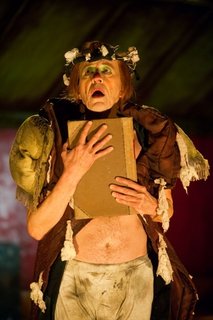
21 Feb 2011 13:43:41
Soon we are waiting a benefit from Geoffrey Rush. Just to be clear, Rush isn't precisely a king here. His character, Poprishchin, just thinks he is, the result of a madness that has him at first hearing conversations between two dogs and then convincing a haughty, midlevel civil servant in czarist Russia that he is, in fact, the King of Spain.
Based on Nikolai Gogol's darkly comic 1853 short story, Rush and director Neil Armfield have brought their "The Diary of a Madman" to America for the first time since its 1989 debut in Australia. It is a marvel.
Rush has thrown himself into this role body and soul, his long, insectlike legs striding across the stage, his almost obscenely long fingers constantly twitching, a curl of hair sprouting clownishly from his forehead. Toward the end, the 59-year-old actor appears with his head shaved, stripped down to seminudity and howling.
Poprishchin narrates the story by reading aloud diary entries in his dingy apartment, which set designer Catherine Martin has painted in garish primary colors, strewn with papers; buckets and pots collect the rain that falls from the broken roof.
Poprishchin is a fussy, yet poor, paper-pusher — "a clerk of the ninth grade" — who has delusions of grandeur and, we learn, has a crush on the boss' daughter, who he learns to his horror is betrothed to another. He wants to find out more about the engagement and decides to study letters sent between his fair maiden's dog and another pooch.
"I've long harbored a suspicion about dogs," he says. "They have this streak of obstinacy. Oh yes. See them watching you, every move you make."
Rush attacks the role with astonishing comic timing — mugging, prat-falling and savoring his witticisms. (He channels his inner Eddie Izzard in his imitation of a cricket.) He is aided by two musicians situated slightly off stage who echo and exaggerate his movements with an array of instruments — a scratch of his head, say, gets a plucked violin string, like a Saturday morning cartoon. Rush is hyper and frantic, handing bowls of soup to audience members and pantomiming his inner thoughts to gales of laughter.
He shares some scenes with the only other actor, Yael Stone, who plays a sweet Finnish maid, the Director's (his boss) angelic daughter and a frightening fellow inmate at an asylum. They are small, physical parts with few words in English, but Stone throws herself into them with as much courage as Rush.
The laughter at the increasing preposterousness of Poprishchin's life grows strangled by the final third of the play. The petty bureaucrat has clearly lost his shaky grasp on reality and become paranoid and delusional.
He believes he is the missing Spanish king, refuses to go to work and begins wearing a gorgeous royal cloak. But the audience knows better: Poprishchin has cut the ragged outfit himself from his own bed linen and added a shabby crown made of wire, candle stubs and quills. (Tess Schofield's costumes are inspired wackiness.) The asylum awaits.
Based on Nikolai Gogol's darkly comic 1853 short story, Rush and director Neil Armfield have brought their "The Diary of a Madman" to America for the first time since its 1989 debut in Australia. It is a marvel.
Rush has thrown himself into this role body and soul, his long, insectlike legs striding across the stage, his almost obscenely long fingers constantly twitching, a curl of hair sprouting clownishly from his forehead. Toward the end, the 59-year-old actor appears with his head shaved, stripped down to seminudity and howling.
Poprishchin narrates the story by reading aloud diary entries in his dingy apartment, which set designer Catherine Martin has painted in garish primary colors, strewn with papers; buckets and pots collect the rain that falls from the broken roof.
Poprishchin is a fussy, yet poor, paper-pusher — "a clerk of the ninth grade" — who has delusions of grandeur and, we learn, has a crush on the boss' daughter, who he learns to his horror is betrothed to another. He wants to find out more about the engagement and decides to study letters sent between his fair maiden's dog and another pooch.
"I've long harbored a suspicion about dogs," he says. "They have this streak of obstinacy. Oh yes. See them watching you, every move you make."
Rush attacks the role with astonishing comic timing — mugging, prat-falling and savoring his witticisms. (He channels his inner Eddie Izzard in his imitation of a cricket.) He is aided by two musicians situated slightly off stage who echo and exaggerate his movements with an array of instruments — a scratch of his head, say, gets a plucked violin string, like a Saturday morning cartoon. Rush is hyper and frantic, handing bowls of soup to audience members and pantomiming his inner thoughts to gales of laughter.
He shares some scenes with the only other actor, Yael Stone, who plays a sweet Finnish maid, the Director's (his boss) angelic daughter and a frightening fellow inmate at an asylum. They are small, physical parts with few words in English, but Stone throws herself into them with as much courage as Rush.
The laughter at the increasing preposterousness of Poprishchin's life grows strangled by the final third of the play. The petty bureaucrat has clearly lost his shaky grasp on reality and become paranoid and delusional.
He believes he is the missing Spanish king, refuses to go to work and begins wearing a gorgeous royal cloak. But the audience knows better: Poprishchin has cut the ragged outfit himself from his own bed linen and added a shabby crown made of wire, candle stubs and quills. (Tess Schofield's costumes are inspired wackiness.) The asylum awaits.

